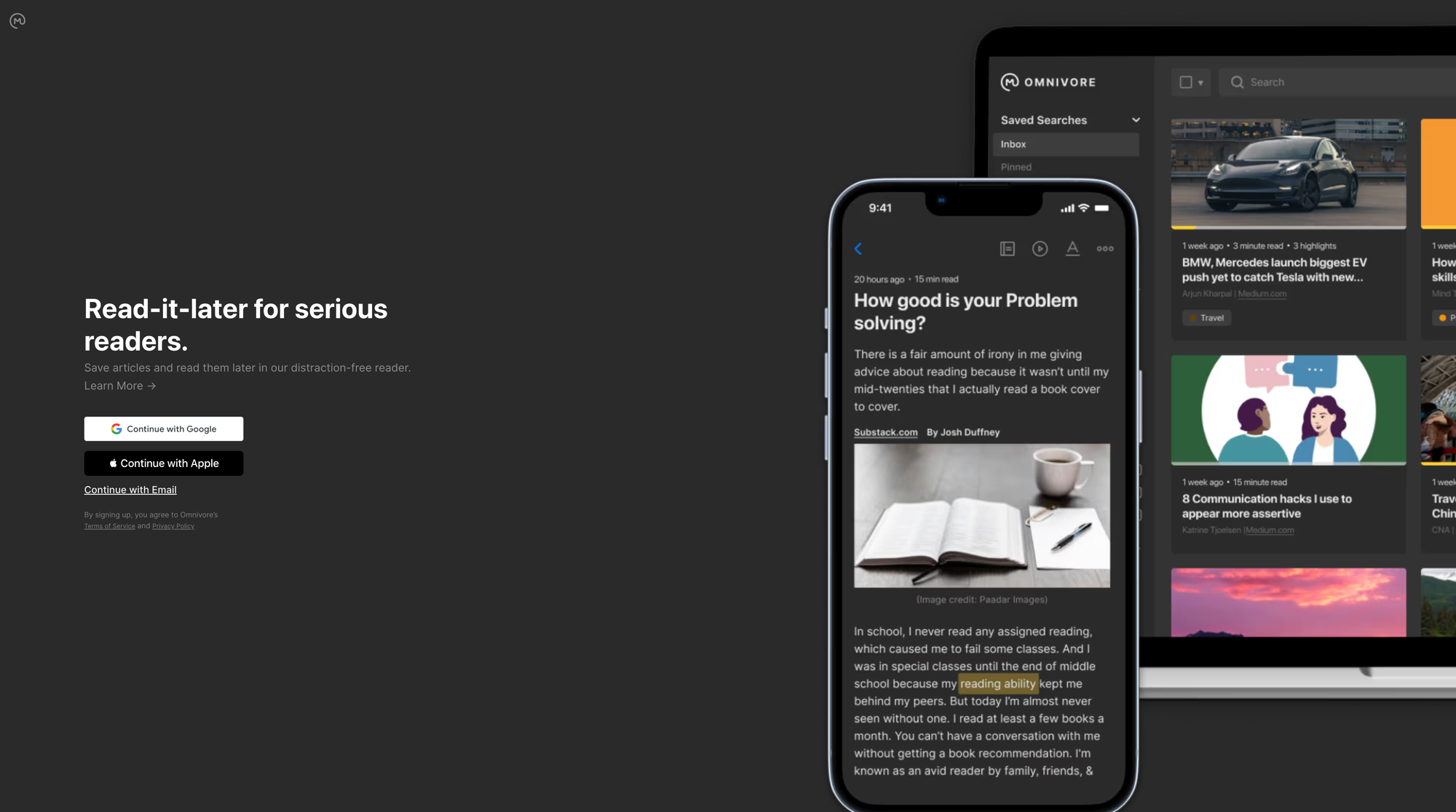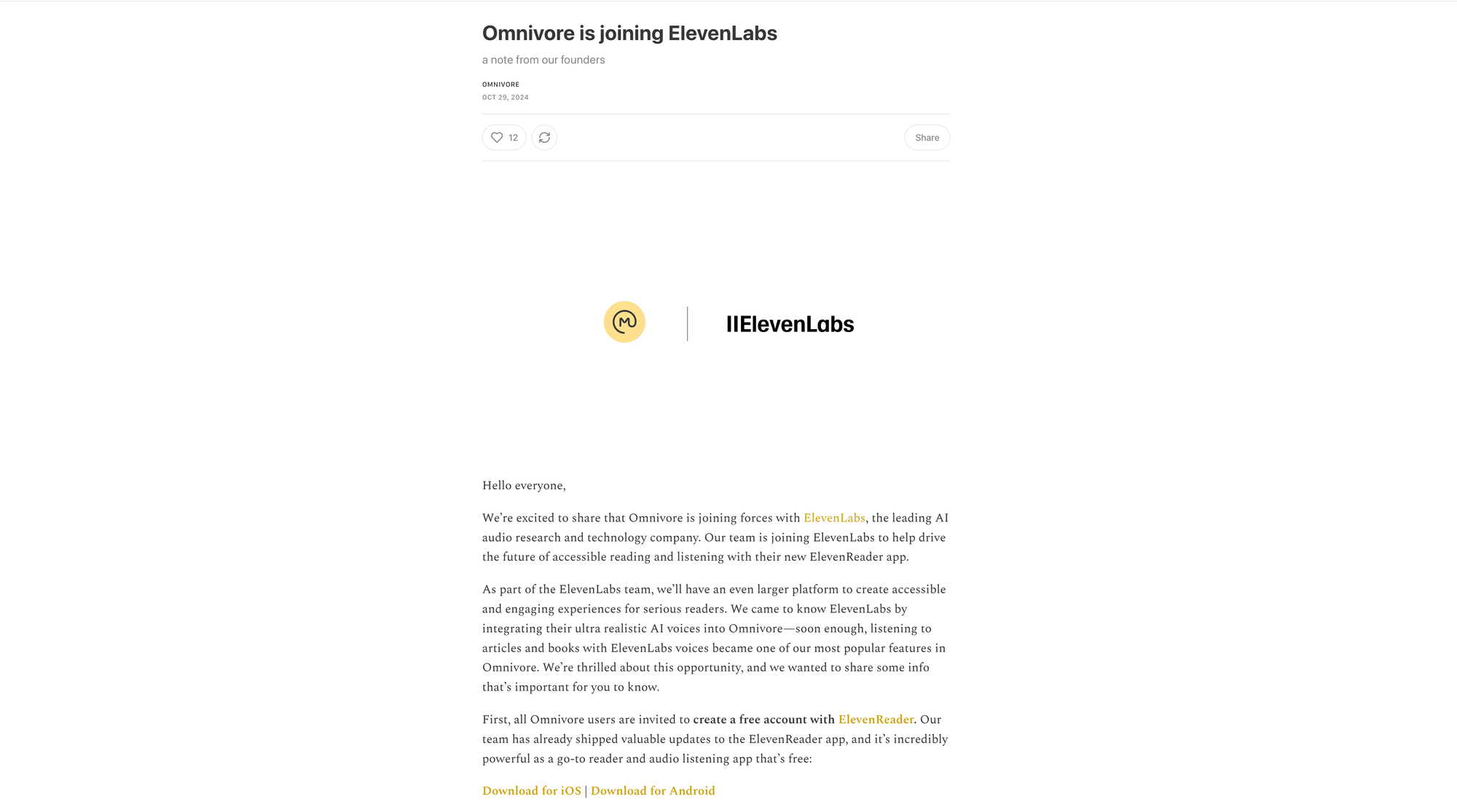The exit(us) of Omnivore – from open-source to AI/VC money
The beloved, open-source reading app Omnivore announced that it got acquired by a16z-backed AI startup ElevenLabs, and shuts down.

Last week, we witnessed a sudden, weird turn of events, as Omnivore announced that it got acquired by ElevenLabs. But let us rewind a bit.
Omnivore was (little spoiler here) a complete, open-source, read-it-later app available for the web, iOS, and Android, with browser extensions for Chrome, Safari, Firefox, and Edge, as well as plugins for Logseq and Obsidian. What a lovely offering. Besides that, Omnivore gave you access to features like highlighting, adding notes, quick and easy search, full keyboard navigation, automatically saving your place in long articles, adding newsletters via email, PDF support, labels, offline support, and more. Omnivore offered a lovely reading experience, and a great way to stay on top of the articles, blog posts, and newsletters you would like to read, all and everything in a single place.
With such an offering, Omnivore quickly became a beloved reading app, not only in the open-source community but in general.

Building software within the open-source community has several unique characteristics. As code gets openly shared, it can be studied which gives developers the possibility to learn from real-world implementations. Most the documentation and discussions are happening in public, which creates a vast knowledge base. The collaborative innovation is in the nature of open-source software as developers from all over the world can contribute their expertise. However, when it comes to the business model of open-source software, it can be challenging. The folks building open-source software can provide hosted solutions, build premium features on top of the open-source cores, or follow dual licensing strategies. It is never easy to find the right balance between free and paid features, and convincing users to pay when the core product is free is yet another tricky task. In case you have free and paid users, there is a certain struggle when it comes to supporting both the open-source community as well as the paying customers. And once you start pursuing commercial interest, you need to maintain the hard-earned trust thanks to your users and the folks who contributed to your product.
The list goes on, as competing with larger companies, explaining the value proposition when the core product is free, building a brand recognition, allocating time between support and product development, unpredictable revenue streams, difficulty in forecasting growth due to a free user base, scaling with limited resources, and a lot more are all challenges you potentially face when pursuing a sustainable open-source software business.
Chances are high Omnivore faced similar challenges (and probably a lot more, as a user pointed out on Mastodon that there is so much technical debt in their codebase after trying to fork it). When you want to build an open-source product that makes money, you should be aware of those challenges up-front. However, it does not feel like Omnivore was aware of that. I have no insider information, as what actually led to this exit, therefore I am only writing about what I am observing and how things appear to me. I am not the only one who was a bit surprised when reading the news about the acquisition. A lot of people enjoyed using Omnivore because it was free. And that might be its biggest issue. Omnivore only monetised through donations. The only reason I can see for this acquisition is that they probably ran out of resources. But, I am still asking myself if they tried to further monetise the product. A beloved product like Omnivore deserves your cash, in fact quality software deserves your cash as Steph Ango points out in his lovely essay.
I loved Omnivore too, not only because it was free (although as someone who experiences subscription fatigue this is highly appreciated) but because it was a lovely reading app. I appreciate apps like Omnivore, and I am thankful for the folks who built it and tried to succeed. However, and again that is just my personal opinion, entering the open-source software community with a goal in mind, building such a beloved product, suddenly selling it to an a16z-backed (that is the venture fund founded by Marc Andreessen and Ben Horrowitz, the folks who declared their allegiance to Donal Trump back in July, and yeah in October Ben Horowitz suddenly decided to make a significant donation to Kamala Harris instead, but if you read up on all mind-boggling stuff going on with those two guys you get what I mean) AI startup, co-founded by Mati Staniszewski, who previously worked at Palantir, you know, the company founded by Peter Thiel (and I guess I do not need to tell you who that guy is), just feels incredibly weird.

I feel like I yet need to point out that I have no idea what has been going on behind the curtains for Omnivore, but this is just what I am, as a user and lover of the product, observes. Besides that, in its announcement email, Omnivore informed its userbase that they have two weeks to download and export all their data, since it will get deleted on November 15, 2024. However, probably based on a lot of criticism, they posted another update recently (oh, did I tell you they were hosting their blog on that site that hosts, platforms, and monetises Nazis?) with some more details on Omnivore shutting down, and in it they informed their users about the extension of the download period, which now ends on November 30, 2024. Additionally, the Omnivore team shared their enthusiasm about the ElevenReader app they are already working on, a cool text-to-speech reader app built on ElevenLabs voice tech ... It's not a dedicated read-it-later app, but it's a great way to listen to any PDF, text, ePub or article ... oh, great, so it is not at all an alternative to Omnivore, right? As alternatives, Omnivore mentioned Readwise Reader or Wallabag, which is also open-source.
So, Omnivore shuts down. Software is ephemeral. The circumstances of that specific shutdown feel simply off. I do wish the Omnivore founders all the best for their future at ElevenLabs, but more importantly, I wish that all Omnivore users find a new, and maybe even better home for all their reading practices.



Discussion